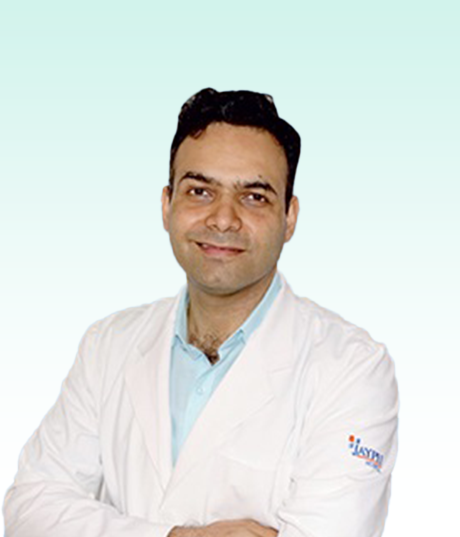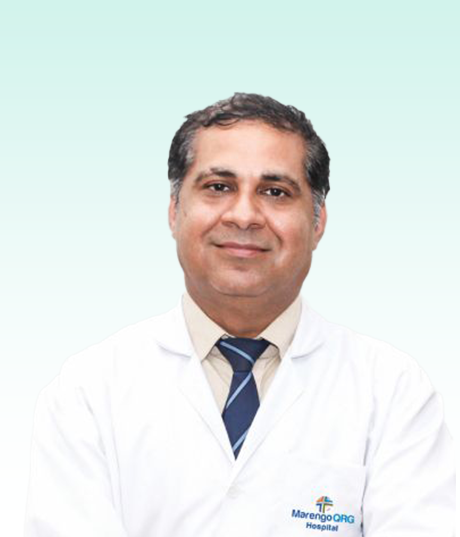Complex Brain Tumor/Craniectomy
Brain tumor is the uncontrolled growth of abnormal cell that increases in size causing damage to the normal brain cells and can be life-threatening. A brain tumor may be a primary tumor (which starts inside the brain) or a secondary tumor (spread to the brain from another part of the body like the lungs or breast, also called a metastasis tumor).

Who Needs Complex Brain Tumor/Craniectomy
Individuals who may require complex brain tumor/craniectomy include:
- Patients with Large Brain Tumors: When a brain tumor reaches a significant size, it can exert pressure on surrounding structures, leading to neurological symptoms. Surgery may be necessary to remove the tumor and relieve symptoms.
- Deep-Seated Tumors: Tumors located deep within the brain, such as those in the basal ganglia or thalamus, may require a craniectomy to access and remove them safely.
- Invasive or Aggressive Tumors: Certain brain tumors exhibit invasive growth patterns, making complete resection challenging. A craniectomy may be necessary to access and remove as much of the tumor as possible.
- Tumors in Critical Areas: Tumors located in critical areas of the brain, such as those near vital structures responsible for essential functions, may require a craniectomy to enable careful tumor removal while preserving normal brain function.
When to See a Specialist
If you have been diagnosed with a brain tumor or are experiencing symptoms such as persistent headaches, seizures, changes in vision, difficulty with balance or coordination, or other neurological signs, it is important to seek medical attention. A specialist, such as a neurosurgeon or an oncologist, can evaluate your condition and determine if a complex brain tumor/craniectomy is necessary.
Procedure
The step-by-step procedure for complex brain tumor/craniectomy typically involves the following:
- Preoperative Evaluation: Prior to the surgery, a comprehensive evaluation is conducted, which may include imaging studies such as magnetic resonance imaging (MRI) or computed tomography (CT) scans to assess the tumor’s size, location, and relationship to adjacent structures.
- Anesthesia: General anesthesia is administered to ensure the patient remains unconscious and pain-free during the procedure.
- Craniectomy: An incision is made on the scalp, and a section of the skull is carefully removed to expose the brain and provide access to the tumor.
- Tumor Resection: The neurosurgeon will work meticulously to remove as much of the tumor as possible while minimizing damage to healthy brain tissue. Advanced imaging techniques and intraoperative monitoring may be used to guide the surgeon.
- Reconstruction: After tumor removal, the bone flap is typically repositioned and secured using plates, screws, or other devices. In some cases, the bone flap may be temporarily preserved outside the body (cranioplasty) and reattached during subsequent surgery.
- Closure: The incision on the scalp is closed using sutures or staples, and a sterile dressing is applied.
- Postoperative Care: Following the surgery, the patient is closely monitored in the intensive care unit (ICU) or a specialized neurosurgical unit. Medications for pain relief and to prevent infection may be prescribed.
- Recovery and Rehabilitation: Recovery time varies depending on the extent of the surgery and the individual’s overall health. Rehabilitation, including physical therapy, occupational therapy, and speech therapy, may be recommended to help regain strength, coordination, and function.
Road to Recovery
The road to recovery after a complex brain tumor/craniectomy can be challenging and may involve:
- Hospital Stay: Patients typically spend several days in the hospital, with the initial days being in the ICU or a neurosurgical unit for close monitoring.
- Pain Management: Medications will be prescribed to manage pain and discomfort during the recovery period.
- Rehabilitation: Depending on the individual’s condition, rehabilitation may be required to regain physical, cognitive, and communication skills. This may involve working with physical therapists, occupational therapists, and speech therapists.
- Follow-up Care: Regular follow-up appointments with the healthcare team are important to monitor recovery, assess healing, and discuss any concerns or complications.
Risk Management
Like any surgical procedure, a complex brain tumor/craniectomy carries certain risks, including:
- Infection: There is a risk of infection at the surgical site or within the brain.
- Bleeding: Bleeding can occur during or after the surgery and may require additional intervention.
- Brain Damage: Despite meticulous surgical techniques, there is a risk of damage to surrounding brain tissue, which may lead to neurological deficits.
- Swelling and Edema: Swelling and edema can occur following the surgery and may require close monitoring and management.
- Complications related to Anesthesia: Anesthesia carries inherent risks, such as adverse reactions or complications.
- Your healthcare team will discuss these risks with you before the surgery and take measures to minimize them.
Benefits of Complex Brain Tumor/Craniectomy
The benefits of complex brain tumor/craniectomy include:
- Tumor Removal: The procedure aims to remove as much of the brain tumor as possible, which can alleviate symptoms and reduce the risk of tumor progression.
- Improved Quality of Life: By addressing the tumor and relieving pressure on surrounding structures, complex brain tumor/craniectomy can significantly improve an individual’s quality of life.
- Treatment Planning: Tumor removal allows for further treatment options, such as radiation therapy or chemotherapy, if necessary.
- Potential Cure: In some cases, complete tumor removal can lead to a cure, particularly for benign tumors.
Frequently Asked Questions
What types of brain tumors may require a craniectomy?
Complex brain tumors that may require a craniectomy include large tumors, deep-seated tumors, invasive or aggressive tumors, or tumors located in critical areas of the brain.
How long does the surgery typically last?
The duration of a complex brain tumor/craniectomy surgery can vary depending on the tumor’s characteristics and complexity. It can range from several hours to more than eight hours in some cases.
Will I experience any changes in cognitive or neurological function after the surgery?
There is a possibility of temporary or permanent changes in cognitive or neurological function after the surgery, depending on the tumor’s location and its relationship with surrounding brain structures. Your healthcare team will discuss potential risks and outcomes specific to your case.
How long does it take to recover from a complex brain tumor/craniectomy?
Recovery time varies for each individual and depends on factors such as the extent of the surgery, overall health, and any potential complications. It can take several weeks to months to achieve a full recovery.
Will I need additional treatments, such as radiation or chemotherapy, after the surgery?
Depending on the tumor type, size, and aggressiveness, additional treatments like radiation therapy or chemotherapy may be recommended to target any remaining tumor cells or reduce the risk of recurrence. Your healthcare team will discuss the appropriate treatment plan for your specific case.
Treatment Plans
- Trauma & intensive care $59
- Aged Care $29
- Community Services $25
- Diagnosis & Investigation $48
- Medical & Surgical $82
- Mental Health $74
- Rehabitation $24
- Specialised Support Service $19
- Trauma & intensive care $59
- Aged Care $29
- Community Services $25
- Diagnosis & Investigation $48
- Medical & Surgical $82
- Mental Health $74
- Rehabitation $24
- Specialised Support Service $19
Treatians As The Best Choice
Treatians understand that seeking medical treatment abroad can be a daunting experience for patients and their families. That’s why the company offers end-to-end support to its clients, from the initial consultation to post-treatment care. The company provides personalized treatment plans that are tailored to meet the individual needs of each patient, and its team of dedicated professionals is always on hand to provide guidance and support throughout the entire process. Contact us at +91- 7982312582, drop your email [email protected]
- Trauma & intensive care
- Aged Care
- Community Services
- Diagnosis & Investigation
- Medical & Surgical
- Mental Health
- Rehabitation
- Specialised Support Service
Service Recipient Says


















We needed kidney treatment and Treatians helped us in getting us with it. They have very good doctors
Tenensse Cambodia